Gouvion Saint-Cyr. Artist with a marshal's baton
Laurent de Gouvion-Saint-Cyr was a versatile gifted person: he painted well (and studied painting seriously), was a good draftsman, tried himself as an architect, and studied music. However, he was not popular in the army and among other associates of Napoleon. The reason for this was the unpleasant "coldness" and lack of communication of this marshal, thanks to which he acquired the not too flattering nicknames "Owl" and "Ice Man". The reason, perhaps, was the troubles in the family, which deformed the character of the future marshal: his mother left the family, leaving her young son, and the relationship with his father was also very difficult.
At the same time, in contrast to the same Davout, who was often rude to officers, but cared about the rank and file. Saint-Cyr was indifferent to any questions not related to the immediate preparation for battles. Marbeau writes: this marshal
Modern researchers, recognizing the military talents of Saint-Cyr and considering him a good tactician, still do not call him a great commander, capable of winning military campaigns on his own. They note his composure on the battlefield, foresight, thoroughness in developing plans. Stendhal writes that Saint-Cyr “was one of the rare military leaders who could pore over studying documents". At the same time, they talk about the stubbornness and inflexibility of this marshal, who, faced with criticism, either continued to do what he considered necessary, or fell into apathy and was inactive, blaming anyone (even Napoleon) for his failures, but not himself.
Early life of Saint-Cyr
Laurent Gouvion Saint-Cyr was born on April 13, 1764 in Lorraine (city of Toul) in a fairly wealthy family of a hereditary tanner Jean-Baptiste Gouvion. From previous articles, you remember that almost all Napoleonic marshals entered military service voluntarily and often against the will of their parents. We see a completely different picture in the case of Saint-Cyr: his father assigned him to the Artillery School, but he did not want to become a military man and in Paris he became a student of the local artist Brenet. Not satisfied with his lessons, he left for Italy. When the young man returned to France, it turned out that the paintings of an unknown painter did not cause public interest, there was nothing to live on, and it was a shame to return home, and I didn’t really want to. And the future marshal got a job in one of the small and not very well-known theater companies, however, he played in it without much brilliance and success. All in all, in royal France, Saint-Cyr was a typical failure with no future or prospects. The opportunity to change his fate, like many others, was given by the Great French Revolution.
Gouvion Saint-Cyr in the Republican Army
In 1792, 28-year-old Saint-Cyr entered one of the volunteer battalions, where, thanks to his studies at the Artillery School, he was selected as a sergeant and then appointed captain.
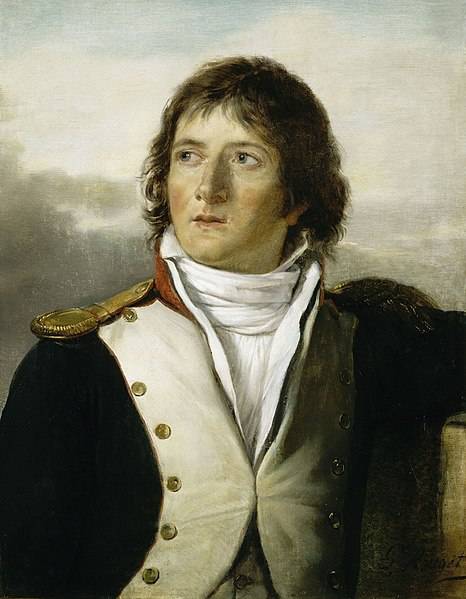
Georges Rouget. Captain Gouvion Saint-Cyr, Captain of the 1st Jaeger Battalion, 1792
Since he was a good draftsman and was well versed in topography, he soon found himself at the headquarters of General Adam Philippe Custine. He was in good standing and his career advancement was rapid: in 1793 Saint-Cyr was promoted to major in the staff service, in 1794 - he became colonel of the topographic department of the army headquarters. It was then that he added to his surname the mother's surname (Saint-Cyr). He did this due to the fact that among his colleagues there were namesakes and confusion often occurred. In June 1794, Saint-Cyr received the rank of brigadier general, but after 6 days he was promoted to divisional. The application for a new title stated:
In 1795, Saint-Cyr was assigned to the Army of the Rhine, where he served under the command of such brilliant generals as Gauche (traditionally considered Bonaparte's main rival), Jourdan (future marshal) and Moreau.
Jean-Victor Moreau, with whom Saint-Cyr did not get along too well, had a rather high opinion of this general. His phrase was known in the army:
And Marbeau, in his memoirs, calls Saint-Cyr "one of the best generals, more talented than most of those to whom Napoleon handed the marshal's baton"(In 1804). But let's not get ahead of ourselves and go back to 1796, when Saint-Cyr was in the Rhine-Moselle army of Jean-Victor Moreau. Despite the initial successes, after the defeat of the allied Sambro-Mass army of Jourdan, Moreau was forced to withdraw from the Danube to the Rhine. This retreat is traditionally rated very highly; researchers consider it one of the pinnacles of Moro's military leadership. And Saint-Cyr acted very effectively then.
In 1798 he was sent to Italy, where in March he replaced the carried away "collection of contributionsGeneral Massena as commander of the Roman army.
The following year, Saint-Cyr was again subordinate to Moreau, whose army in Italy opposed the Russian-Austrian troops of Suvorov. In the Battle of Novi, lost by the French, he showed himself well, commanding the rearguard, thanks to which Moreau was able to withdraw the remnants of his troops to Genoa. However, at the same time, ill-wishers accused Saint-Cyr of not coming to the aid of Vatren's division. They even assured that, watching her beating from the side, he declared with satisfaction:
(Saint-Cyr, as you remember, was the representative of the northern armies of the French Republic).
Already on the island of Saint Helena, Napoleon said, recalling Saint-Cyr:
In 1800 Saint-Cyr commanded the III Corps of Moreau's Rhine Army. However, he often ignored the orders of the commander, preferring to act independently. As a result, during the battle of Meskirche, Saint-Cyr's corps approached too late, which allowed the Austrians to save their army from complete defeat. True, the next day the late Saint-Cyr corps defeated the Austrians at Biberach. However, not only Moreau, but also other generals and senior officers began to accuse Saint-Cyr of arrogance and even hint of betrayal. The offended "hero" in protest practically stopped interaction with the main army. Moreau in this case clearly lacked the determination of Bonaparte, who once, seeing Saint-Cyr's unwillingness to go to command the troops in Naples, told the obstinate general that if two hours later he was not seen on the road to Naples, he would be shot on the Field of Grenelle by noon ... That was the end of the discussion.
In 1801 Saint-Cyr replaced Lucien Bonaparte as Ambassador of the French Republic to Spain. Then he returned to Italy.
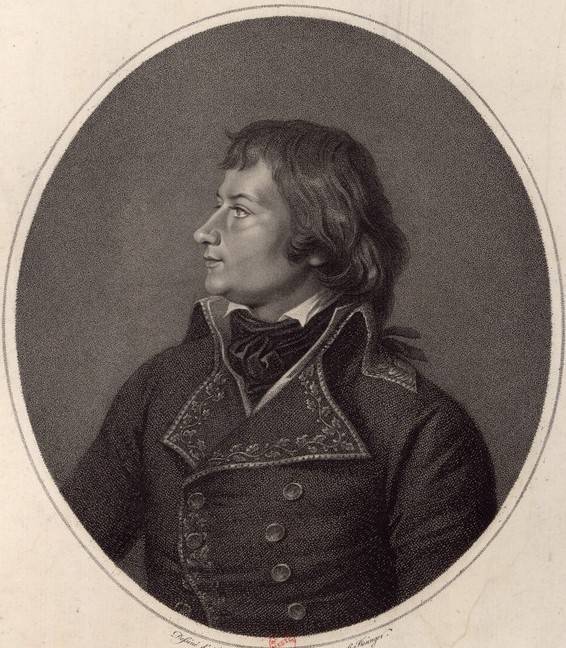
Jean Urbain Guerin. Portrait of Saint-Cyr, 1801
Imperial period of service of Saint-Cyr
In 1804, a member of the Tribunate, Jean François Curet, came up with a proposal to elect Napoleon as emperor:
This is how a pun appeared in Paris:
For the first time, by the way, Berthier turned to Bonaparte with a similar proposal - back in 1801. This aroused the wrath of Napoleon, who even publicly beat his closest associate. Most historians regard this scene as a pre-staged performance designed to show the immutability of the Republican convictions of the First Consul. Others believe that the marshal was in a hurry: he guessed the direction of Bonaparte's thoughts, but voiced them too early.
Curé, to whom Napoleon would later give the title of count, probably also did not act spontaneously. Senators also got it right and, "for the glory and prosperity of the Republic", Proclaimed Bonaparte"Emperor of the French". They took into account that Napoleon does not want to be a king - the "heir" of the compromised Bourbons, but wants to become on a par with Augustus, Trajan and Charlemagne. True, not everyone understood at once how radically the situation in the country had changed. The fact is that revolutionary France was guided by republican Rome, where the imperium, as a symbol of the highest military and civil power, received consuls and praetors. And the "republican emperors" were not hereditary monarchs and received the "imperium" not by "God's grace", but on behalf of the Roman people, and not for life, but for a certain period of time. In addition, after a great victory, soldiers of one of the armies could proclaim their commanders as emperors. It was just an honorary title, and such "army" emperors did not have any additional rights and privileges.
The first emperor of the Roman Republic was Publius Cornelius Scipio Africanus. Sulla and Pompey had the Imperium. And the last of these republican emperors was Gaius Julius Caesar. And the most slow-witted for a while tried to call Napoleon “Emperor of the French Republic».
Saint-Cyr was one of the few who refused to sign the petition for Napoleon to accept the title of emperor. However, this “opposition” of his had no consequences. Saint-Cyr became colonel-general of the cuirassiers of the Imperial Guard, during the 1805 campaign he led one of the corps in Massena's army. Then he defeated the Austrians at the Battle of Castelfranco, taking about 5 thousand prisoners.
Then Saint-Cyr acted as the head of the deserted camp of Boulogne. According to contemporaries, he did not show much interest in business, relying on his deputies, and was mainly engaged in painting.
In 1807 he acquired the Reverso Castle. It was in it that he spent the last 10 years of his life. This castle still belongs to his family.
In 1808 Saint-Cyr was sent to Catalonia. Here on December 21, he won a victory at Molino del Rey, but this was his only success. Later, Saint-Cyr even accused Napoleon of having deliberately sent him to the Iberian War in order to discredit and damage his reputation - in retaliation for the fact that he was a representative of the Rhine army and for a long time served under the command of the disgraced General Moreau.
As a result, Napoleon ordered Saint-Cyr to transfer his corps to General Suchet, who just acted very effectively. This was discussed in the article "Perhaps, Suchet?".
1812 year
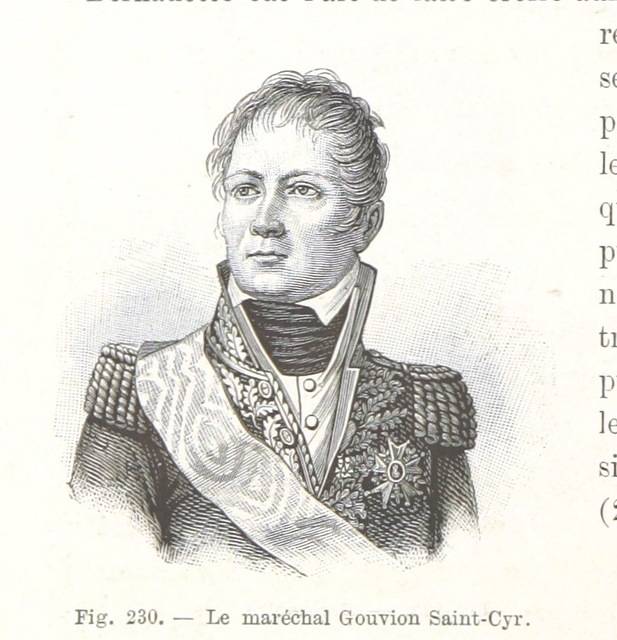
Saint-Cyr on an engraving from the collection "Napoleon I and His Time"
The rank of Marshal Gouvion Saint-Cyr received in 1812 during a campaign in Russia. At that time, he led the VI Corps of the Great Army, which was supposed to provide support to the troops of Marshal Oudinot sent to Polotsk. They were opposed by Wittgenstein's Russian army, which covered the road to St. Petersburg. The first military clashes here took place on August 16 - simultaneously with the Smolensk battle. Wittgenstein's troops pushed the French hard, and Saint-Cyr was in his repertoire, answering all Oudinot's questions with mocking bows and the words “Your Excellency Mr. Marshal!»
Marbeau explains:
Only after the injury of Oudinot, who was evacuated to Vilno, Saint-Cyr, taking command over himself, threw Wittgenstein back, for which he received the rank of marshal. After that Saint-Cyr, comfortably accommodated in one of the monasteries, was inactive until mid-October. Finally, Wittgenstein decided to attack Polotsk again. Saint-Cyr repulsed this attack (in one of the battles he was wounded), but upon learning that the Russian corps of General Steingel was moving along the left bank of the Dvina to Polotsk, he left the city and went to meet the new enemy. Having defeated Steingel, he moved his troops to join the main army. Napoleon sent Victor's IX corps to meet him. Saint-Cyr, having transferred command to General Legrand, under the pretext of the need for treatment, went to France.
1813 Campaign
Returning to service, Saint-Cyr was given command of the XIV Corps, with which he took part in the initially successful Saxon campaign. He was tasked with protecting Dresden, which served as the main base of the French army.
While Napoleon was trying to defeat Blucher, retreating in front of him, in a field battle, the Russian-Austrian army under the command of Schwarzenberg approached the city. Saint-Cyr managed to hold out until the approach of the main forces, and in a two-day battle, the coalition forces were again defeated. And here the character of Saint-Cyr again manifested itself: ill-wishers claimed that he deliberately pursued the retreating opponents too slowly and did not provide assistance to General Vandam. As a result, Vandam was defeated and captured at Kulm. This unexpected victory encouraged the Allies and prompted them to abandon new negotiations with Bonaparte.
During the grandiose three-day battle at Leipzig, Saint-Cyr was in Dresden. He was instructed to gather troops in the fortresses located on the Elbe and to withdraw them beyond the Rhine. However, after Napoleon's retreat to France, Dresden was besieged by the troops of General Klena. An attempt to break through to join the French troops in the Torgau fortress (77 km north-west of Dresden) was unsuccessful. On November 11, Saint-Cyr signed an agreement with Klena to leave Dresden in exchange for the possibility of free passage to France. However, the Allied High Command refused to abide by this treaty. With his soldiers lacking food and ammunition, Saint-Cyr, the only one of Napoleon's marshals, chose to surrender. He gave his sword to the little-known Russian general M.L. Bulatov.
Commenting on the fall of Dresden, Bonaparte wrote:
And further:
In the service of the Bourbons
Before Napoleon's abdication, Gouvion Saint-Cyr lived comfortably in the resort of Carlsbad, then he swore allegiance to the Bourbons, having received the title of peerage from Louis XVIII and the post of commander of the troops in Orleans.
After Napoleon's return, Saint-Cyr refused to join the emperor, but did not want to go to Vendée to lead a new royalist revolt there. After the return of Louis, the marshal was appointed minister of war and initiated reforms that are highly appreciated by experts.
In 1817 Saint-Cyr received the title of Marquis. Until the end, however, the Bourbons still did not trust him, and therefore in 1819 he was dismissed. Quietly and unnoticed, the marshal lived in his castle for almost 11 years, wrote his memoirs and was engaged in agriculture. Here he died in March 1830. The cause of his death was a stroke. Buried Saint-Cyr was at the Père Lachaise cemetery.
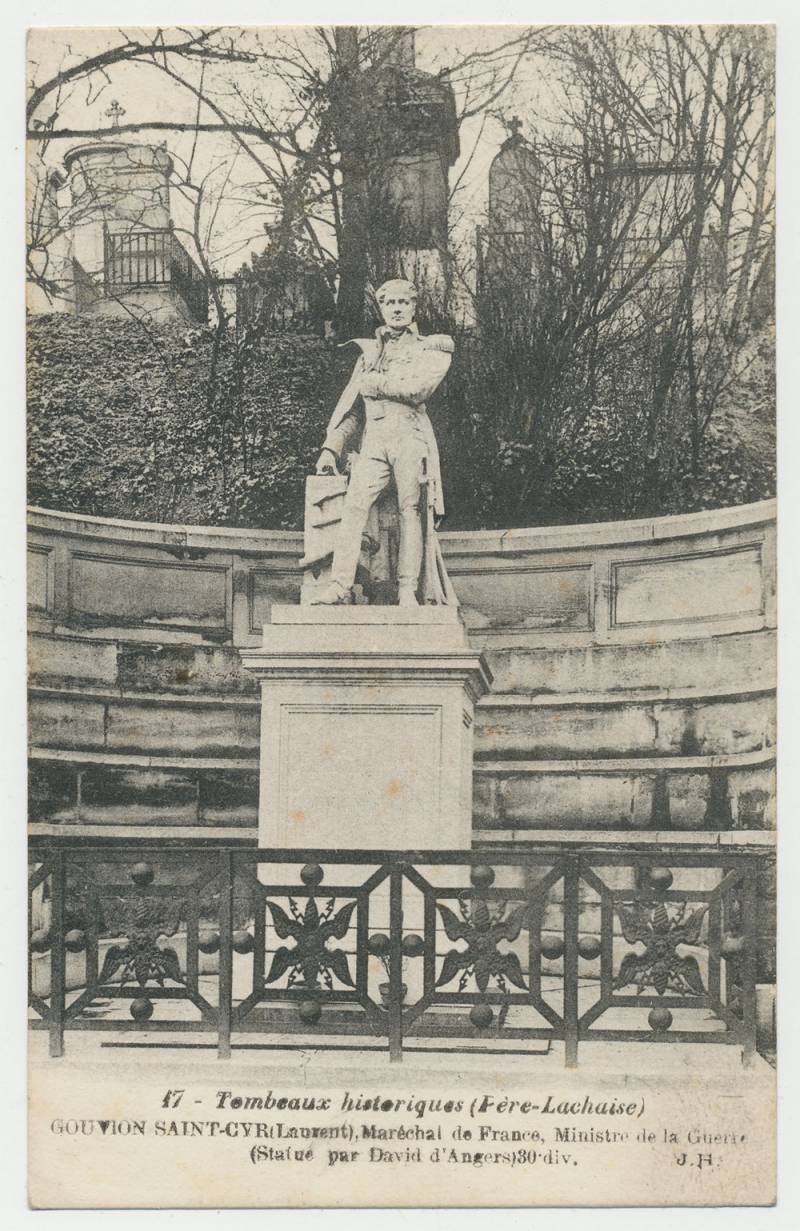
Tomb of Marshal Saint-Cyr at the Père Lachaise cemetery. Postcard from the collection "Le Pere Lachaise historique" de Fernand Fleury
Now look at the portrait of Saint-Cyr by O. Vernet:
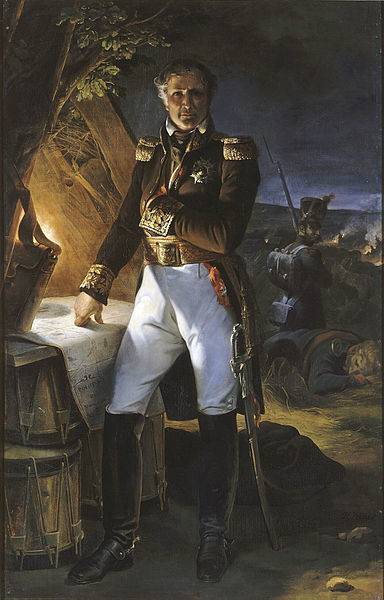
Sounds like it, doesn't it?
The eulogy at his grave was delivered by Marshal Mortier, who will outlive him for 5 years, and in July 1835 will die as a result of a terrorist attack.
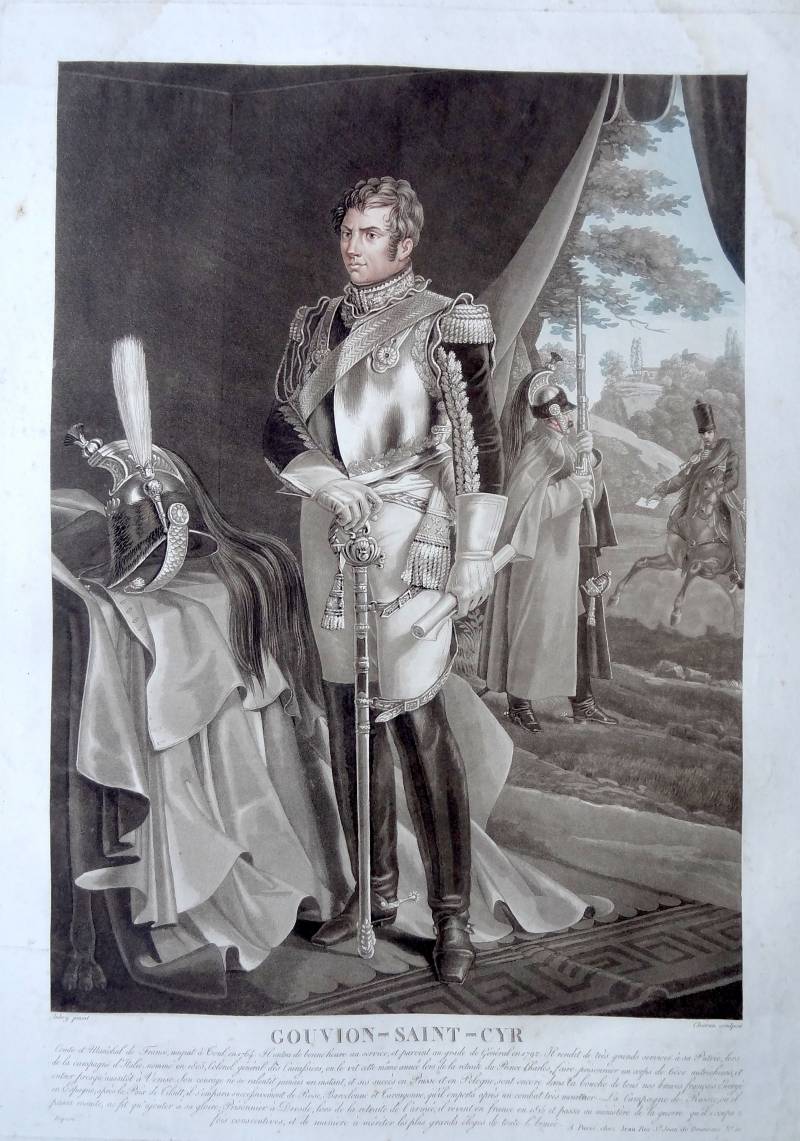
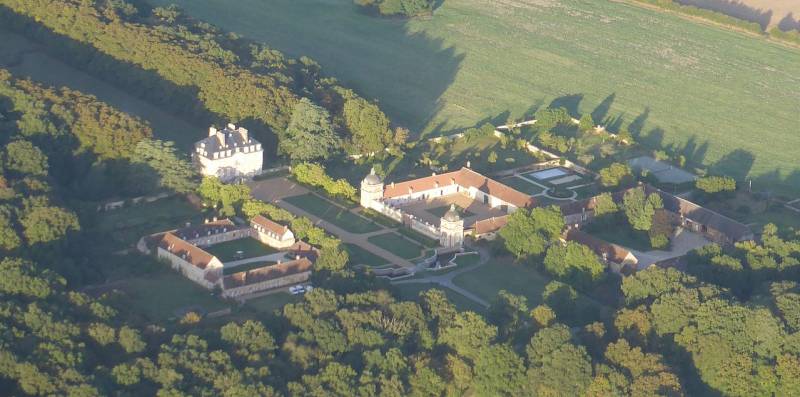
Information